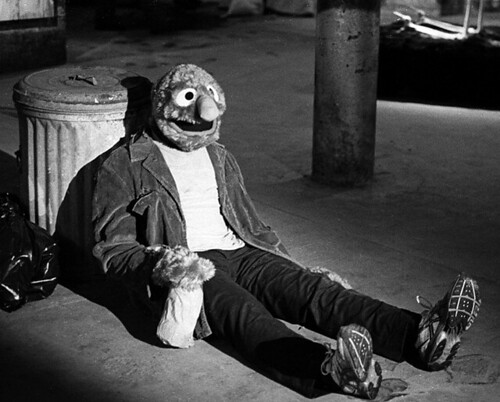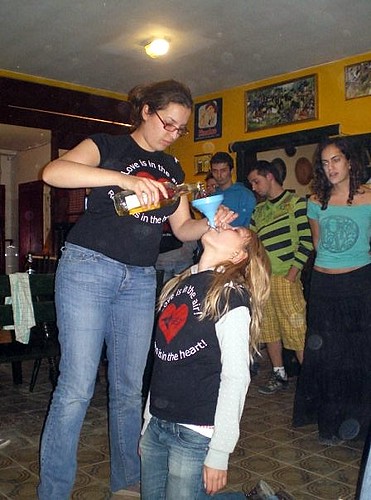“Contrary to popular belief, most people who use substances do so in ways that cause them relatively little harm”
(end quote).
Why would this be so? Not that it causes relatively little harm but that it would be contrary to popular belief. Why would the wider community have a contrary belief to this?
There are a number of reasons for this which in part answer the question which is the title of this paper. The Australian Psychological Society (APS) has done a position paper on substance use. Now the guys that put these position papers together hard nosed MFs, who eat, sleep and s**t science. You can be sure they know the area very well, they are relatively free of any political pressure so you are going to get a pretty good statement about the science of the area under investigation.
To quote them:
“In Australian history, laws regarding the legality or illegality of certain drugs have been politically driven, and had little to do with the level of use or possible harms that the substances themselves might cause.” (p3)

This creates a problem for government because they say to the public that they are making some drugs illegal because they are dangerous to people’s health. They profess that it is a health issue and what they are doing is for the good of the public. Unfortunately this is not so. They are doing it at least in part for their own political well-being not for the good of the public.
To sell this to the public they then have to set about demonising illegal drugs. They have to exaggerate the dangers thus trying to convince the public that they are acting for their well-being and not for their own political survival.
Thus they demonise illegal drugs in all sorts of ways and hence one ends up with the contrary belief in the wider community that I mentioned earlier. The general public believe illegal drugs are much more dangerous than they actually are and the government has made them illegal to protect us.

From a pure lethality point of view consider this chart below. This was put together by two psychologists who work at Liverpool University in the UK. They looked at the official causes of death through the 1990s and then calculated the risk of death per 100,000 people. They came up with a chart that shows which things are risky for us and which things are less risky for us. Included in it are various drugs.
Very high risk
Tobacco, methadone, injecting drug use, BASE jumping, grand prix racing, cancer, heart disease, space travel
Quite high risk
Heroin, Morphine, barbiturates, alcohol, hang gliding, parachuting, motorbike racing, sudden infant death, working in mining, asbestos poisoning, strokes, prostrate cancer, shaking of babies, off shore oil work
Medium risk
Solvents, benzodiazepines, motor sports, water sports canoeing, diabetes, skin cancer, influenza, suicide, giving birth, helicopter travel, liposuction, working in farming, being in police custody, working in construction
Quite low risk
Ecstasy, MDMA, speed, cocaine, contraception pill, GBH, fighting sports, snow sports soccer & rugby, Asthma, AIDS. meningitis, cervical cancer, food poisoning, air travel, being murdered, chocking on food, electrocution, drowning, passive smoking, factory work
Very low risk
LSD, magic mushrooms, viagra, fair ground rides, swimming, riding sports, food allergies, syphilis, malaria, appendicitis, pedestrian crossings, clothes catching fire, falling out of bed, vaccination, abortion, storms, terrorism
Extremely low risk
Marijuana, cannabis resin, indoor sports, playgrounds, peanut allergy, measles, insect stings, copulation, starvation, dogs, lightening, nuclear radiation, police shootings
Negligible risk
Caffeine, nitrous oxide, ketamine, computer games, masturbation, small pox, leprosy, sharks, cats, meteorites, executions, volcanoes

If the government was acting purely for the health of the community it would change the laws on which drugs were illegal. It would make tobacco and alcohol illegal and make marijuana, LSD and ecstacy legal. There is as much chance of dying from ecstacy as there is from choking to death on your dinner or being blown up in a plane by a terrorist. In addition as far as drugs go marijuana is the safest drug you are going to get.
Then some will argue that marijuana may not kill you but it can make you go crazy with a cannabis induced psychosis. Unfortunately as time rolls on the science has simply not backed up this hypothesis. Yes it is very unwise for a person with a propensity for psychotic symptoms to use marijuana and the vast majority of marijuana users will suffer no mental health problems at all. Hence back to the original quote from my newly purchased addictions counselling book and the APS position paper.
Is a government going to make such legislative changes with illegal drugs? I don’t think so. If they did they wouldn’t be in government for very long which is why they have to exaggerate the dangers of illegal drugs and thus mislead the public in this way. Pretend to act for the good of the public when they are actually acting for their own political survival.
However despite all the politics this does raise some interesting questions for the drug counsellor and indeed parents of children who may use drugs. Does a drug counsellor (or parent) use scare tactics with the client (child).

One way to try and stop a person using drugs is to make such a thing very scary for them. Get them to believe that drugs are much more dangerous than they actually are so they get scared and don’t use. Commonly known as scare tactics.
To do this you have to lie to them even if only lying by omission. Is it OK and therapeutic for a counsellor to lie to a client? Most would argue no. To my mind you have to tell the drug user the truth even when you don’t like what the truth is.
If you tell them that marijuana can make people go crazy the first thing they will do is make their own observations. With the vast majority of marijuana users they will think - “Well I have smoked marijuana and I haven’t gone crazy”. Then they will look around at all their marijuana using friends and see that none of them have not gone crazy as well. After making these observations what is the drug user going to think - “My counsellor is lying to me”, as indeed he is.
As a result trust is broken, the therapeutic relationship is damaged and the counselling suffers, at times significantly. Besides this most drug users have heard it all before anyway. Their parents, teachers, the police, the press, the government and drug counsellors have all exaggerated the dangers of drugs to them many times before. So if you, the current drug counsellor comes along and tells the user the truth and the WHOLE truth they are going to be surprised and maybe even shocked by such a transaction from you. Thus the therapeutic relationship is placed on a much more robust footing and the drug counselling is more likely to be successful.

If you lie to the teenager can you expect them to tell you all of what they are doing?
In particular they are more likely to be truthful with you about what they are doing and why they are doing it. Can you really expect a client to be truthful with you, the counsellor, when you are lying to them in the first place. If you lie to them you have to expect them to lie back to you.
Graffiti
I generally agree with your point with one exception: the class of risk you quoted are in reference to the whole population, in order to compute the real risk this should be multiplied by the percentage of users in the population. (I mean - in the general population the number of dead from masturbation can be similar to that of execution but how many "users" of one and the other was makes all the difference.
ReplyDeleteThe "prohibition" times in the US in the 1920s/30s show what it's all about - it was supposed to support morality but supported the crime and underworld instead. as a Russian prime minister commented (something else of course) "We wanted the best, but it turned out as always"
I am pretty sure that the same effect is going on with marijuana, that if a strong popular movement supporting legalization emerges then mafias will hire the best lobbyist to convince the society that this is going to decimate them.
In Europe two countries have laws allowing to sell it in small quantities. And if there are trouble in these countries (where not these times?) it's definitely not connected to drug use.
Good point Zbig about society troubles and marijuana use. In Australia small quantities of possession are decriminalized. Many a society has collapsed because economic torubles, political troubles, religious troubles. I don't know of any society that has collapsed because of a drug problem.
ReplyDeleteRegarding the class of risk I had the same concern as you but they did allow for what you say. They estimated the number who engage in the activity and then the numbers who have died and came up with the percentages and level of risk.
Cheers
Tony
In my part of the U.S., the media focuses more on the dangers of prescription drug abuse (oxycontin, oxycodone) than illegal drug abuse. I don’t know which problem is really worse; the terrain favors marijuana growing and plenty of people do that around here. Interestingly, many of the counties around here are dry, meaning no packaged or by-the-drink alcohol is sold. Our situation makes for interesting arguments between religious leaders (in favor of keeping it dry) and business leaders (in favor of legalizing alcohol which will ultimately attract more commerce to the area).
ReplyDeleteI see no reason to lie to my kids about the dangers of misusing drugs; they get plenty of talks on that in school. I remind them that the consequences of being caught will more than likely outweigh the fun of drinking or doing drugs with their friends - their parents don’t approve, getting a job will be difficult with a police record, and any decent-paying job is going to require them to pass a drug test.
There are advertisements on tv recently saying if you get caught drug driving and harming someone in an accident the "you will go to jail". They have never said that about drink driving to my knowledge. As if trying to administer authoritative scare tactics on drug users is going to work!! I guess the grim reaper worked for a little bit?
ReplyDeleteK
Ever watched the UK tv programme Shameless?
ReplyDeleteAs the character frank Gallagher would say
"Tickets this way for the Chatsworth Express
Come and watch pikeys making a mess
Of the lives they were given by him upstairs
And kids they're convinced aren't actually theirs
What sound on earth could ever replace
Kids needing money and wives in your face
Cos this, people reckon, and me included,
Is why pubs and drugs were kindly invented
To calm us all down, stop us going mental
These are Chatsworth Estate's basic essentials
We are worth every penny, we're grinding your axes
You sit on our head, but you pay the taxes
Imagine a Britain without Chatsworth buccaneers
We'll come on your face for the price of a beer
Make poverty history, cheaper drugs now
Make poverty history, cheaper drugs now!"
No matter if some one searches for his essential thing, therefore he/she wants to be available that in detail, so
ReplyDeletethat thing is maintained over here.
Here is my web site creative group